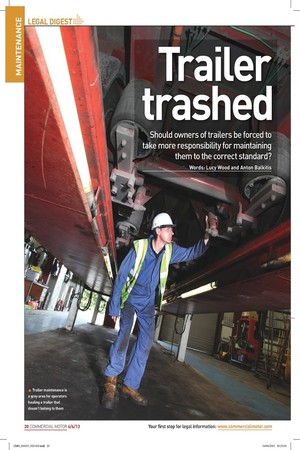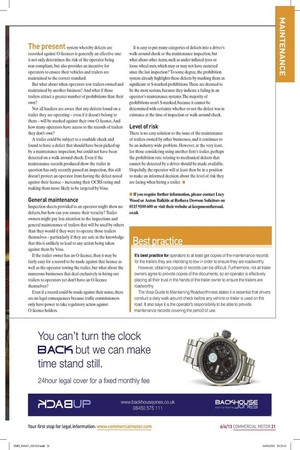Should owners of trailers be forced to take more responsibility for maintaining them to the correct standard?
Page 16

Page 17

If you've noticed an error in this article please click here to report it so we can fix it.
Words: Lucy Wood and Anton Batkitis The present system whereby defects are recorded against 0-licences is generally an effective one: it not only determines the risk of the operator being non-compliant, but also provides an incentive for operators to ensure their vehicles and trailers are maintained to the correct standard.
But what about when operators tow trailers owned and maintained by another business? And what if those trailers attract a greater number of prohibitions than their own?
Not all hauliers are aware that any defects found on a trailer they are operating — even if it doesn't belong to them — will be marked against their own 0-licence. And how many operators have access to the records of trailers they don't own?
A trailer could be subject to a roadside check and found to have a defect that should have been picked up by a maintenance inspection, but could not have been detected on a walk-around check. Even if the maintenance records produced show the trailer in question has only recently passed an inspection, this still doesn't protect an operator from having the defect noted against their licence — increasing their OCRS rating and making them more likely to be targeted by Vosa.
General maintenance Inspection sheets provided to an operator might show no defects, but how can you ensure their veracity? Trailer owners might pay less attention to the inspections and general maintenance of trailers that will be used by others than they would if they were to operate those trailers themselves — particularly if they are safe in the knowledge that this is unlikely to lead to any action being taken against them by Vosa.
If the trailer owner has an 0-licence, then it may be fairly easy for a record to be made against that licence as well as the operator towing the trailer, but what about the numerous businesses that deal exclusively in hiring out trailers to operators yet don't have an 0-licence themselves?
Even if a record could be made against their name, there are no legal consequences because traffic commissioners only have power to take regulatory action against 0-licence holders. It is easy to put many categories of defects into a driver's walk-around check or the maintenance inspection, but what about other items, such as under-inflated tyres or loose wheel nuts, which may or may not have occurred since the last inspection? To some degree, the prohibition system already highlights these defects by marking them as significant or S-marked prohibitions. These are deemed to be the most serious, because they indicate a failing in an operator's maintenance systems. The majority of prohibitions aren't S-marked, because it cannot be determined with certainty whether or not the defect was in existence at the time of inspection or walk-around check.
Level of risk There is no easy solution to the issue of the maintenance of trailers owned by other businesses, and it continues to be an industry-wide problem. However, at the very least, for those considering using another firm's trailer, perhaps the prohibition rate relating to mechanical defects that cannot be detected by a driver should be made available. Hopefully, the operator will at least then be in a position to make an informed decision about the level of risk they are facing when hiring a trailer. • • If you require further information, please contact Lucy Wood or Anton Balkitis at Rothera Dowson Solicitors on 0115 9100 600 or visit their website at keepmeontheroad. co.uk It's best practice for operators to at least get copies of the maintenance records for the trailers they are intending to tow in order to ensure they are roadworthy.
However, obtaining copies of records can be difficult. Furthermore, not all trailer owners agree to provide copies of the documents, so an operator is effectively placing all their trust in the hands of the trailer owner to ensure the trailers are roadworthy.
The Vosa Guide to Maintaining Roadworthiness states it is essential that drivers conduct a daily walk-around check before any vehicle or trailer is used on the road. It also says it is the operator's responsibility to be able to provide maintenance records covering the period of use.










































